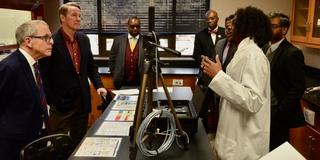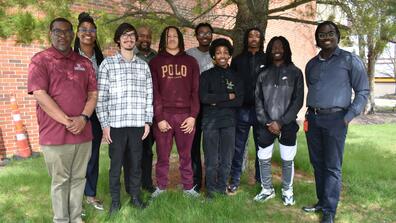Governor's visit boosts morale of JWGCESTA faculty and students

Ohio Gov. Mike DeWine, accompanied by Lt. Gov. Jon Husted and the governor’s aides, recently dropped in for a roughly an hour’s visit of Central State University’s John W. Garland College of Engineering, Science, Technology, and Agriculture.
Months after the governor’s 2023 fall-break visit, JWGCESTA students and faculty are still relishing meeting him face-to-face and cherishing his words of encouragement for their research work and praise of the CSU curriculum.
The governor and his team chose Central State to announce Ohio’s latest Super RAPIDS (Regionally Aligned Priorities in Delivering Skills) initiative, earmarking $40 million to a handful of institutions of higher education across the state “to help address urgent workforce development needs and provides a one-time funding boost,” according to a release from the state.
Central State officials and faculty heard the news directly during the governor’s visit that Ohio’s only public Historically Black College or University will receive a new grant of $719,000 worth of equipment to ensure “that training providers have the right kind of resources and equipment needed to educate the next generation for the jobs of the future,” the press release added.
CSU previously received more than $400,000 worth of equipment through Ohio’s RAPIDS funds.
DeWine toured the Vibration, Air, and Noise (VAN) laboratory, a transportation lab, one of the five labs where equipment for the RAPIDS project will be installed or upgraded.
Jalen Smith, a 2023 graduate of Environmental Engineering, demonstrated the workings of some equipment to the governor and his entourage.
“The governor came and toured one of our labs, where one of our students explained to him and his team what we do in the area of transportation,” said Arunasalam Rahunanthan, Ph.D., interim dean of JWGCESTA. “The governor and lieutenant governor listened attentively. We are grateful to Gov. DeWine and Mr. Jon Husted for taking time out of their busy schedule to visit us at Central State.”
“As we prepare for computer chip and advanced manufacturing supply chain jobs, it’s crucial to support and create new lab and manufacturing technology spaces for educating graduates with the most advanced skills through higher education." — Ohio Lt. Gov. Jon Husted
“This (Super RAPIDS) program helps Ohio technical centers, community colleges, and universities purchase the latest equipment to educate more students on the most up-to-date technology needed for the 21st-century economy," Husted said.
The governor and his entourage were received by Dr. F. Erik Brooks, provost and vice president for Academic Affairs, and Dr. Morakinyo Kuti, President-elect, vice president for research and economic development, and director of CSU 1890 Land-Grant Programs.
Kuti noted that CSU has been putting equipment received so far from the RAPIDS program to effective use for its students’ education.
“Faculty in the departments of Mathematics and Computer Science, Manufacturing Engineering, and Water Resources Management are using (the RAPIDS) equipment in more than 30 academic courses in six-degree programs to educate and train students who will contribute to Ohio’s industries,” he said.
“More than 300 Central State University students have been trained to use this equipment that have applications in advanced and additive manufacturing, robotics, cybersecurity, and transportation.” — Dr. Morakinyo Kuti
With the Super RAPIDS equipment received this time around, JWGCESTA will distribute them across the three targeted departments to establish and upgrade a total of five labs and enhance 27 undergraduate courses in science, technology, engineering, and mathematics.
“The equipment requested in our proposal will directly support the educational objectives of our college, ensuring that our students and researchers have access to modern equipment and state-of-the-art technology for hands-on practices,” said Dr. Deng Cao, professor of computer science who will serve as project director. “As we strive to achieve our mission and vision, it is essential to invest in equipment that will set our programs apart and prepare our graduates to be at the forefront of the growing cybersecurity, semiconductor, environmental engineering, and advanced manufacturing industry.”
RAPIDS grants will also fund JWGCESTA’s purchase of new equipment, including a GPU Cluster, a Semiconductor Device Analyzer, and ACE-DHRM-10x Probe Station. The purchases will also include 56 high-performance workstations and 24 refurbished computers.
The labs slated for an upgrade or building from scratch will include:
- Microfabrication Lab, which will enable students to design and simulate Field Programmable Gate Array digital systems.
- Semiconductor Simulation Lab, which will facilitate smoother simulation workflows with Cadence software.
- Field Programmable Gate Array Lab, which will enable students to design and simulate FPGA-based digital systems.
- Integrated Energy Systems Lab for developing transportation-related renewable and alternative energy education and training.
- Cybersecurity Lab, which will support a new cybersecurity certificate program and cyber-related courses and research.
Several degree programs will be supported by the RAPIDS project, including a bachelor’s degree in Manufacturing Engineering, Environmental Engineering, and Computer Science and certificates in Cybersecurity and Intel Semiconductor Education and Research.
Ohio’s RAPIDS grants help benefiting institutions to purchase equipment for use in interdisciplinary classrooms specific to regional workforce needs, enabling students to acquire an affordable, high-quality education. Types of industries benefiting from RAPIDS include advanced manufacturing, information technology, cybersecurity, broadband/5G, healthcare, and robotics.
“Super RAPIDS provides campuses with an enhanced opportunity to prepare their students for high-demand jobs,” said Ohio Department of Higher Education Chancellor Randy Gardner. “I encourage colleges and technical centers to take advantage of this funding boost and strive to make even greater contributions to Ohio’s skilled workforce.”
“It is essential for engineering and technology (college) curricula to include interdisciplinary aspects of engineering, energy, environment, and sustainability,” said Dr. Ramanitharan Kandiah, chair and professor of Environmental Engineering. “In this context, providing knowledge about renewable energy and offering practical training with renewable energy equipment becomes crucial for engineering and technology students.
“Renewable energy is progressively gaining dominance over traditional energy sources in various sectors of society,” Dr. Kandiah added. “Its adoption not only helps in mitigating the impacts of global warming but also plays a significant role in reducing adverse effects on human and animal health, the environment, and the economy, particularly transportation.”
JWGCESTA faculty and others who will supervise RAPIDS-funded CSU projects will include:
- Dr. Morakinyo A.O. Kuti (chief contact), President-elect, vice president for Research and Economic Development, and director of the 1890 Land-Grant Programs.
- Dr. Arunasalam Rahunanthan (supervisor), professor of Mathematics and interim dean of JWGCESTA.
- Dr. Deng Cao (project director), professor of Computer Science
- Dr. Mahmoud Abdallah, professor of Systems Engineering
- Dr. Emdad Ahmed, assistant professor of Computer Science
- Dr. Mohammadreza Hadizadeh, associate professor of Physics
- Dr. Ramanitharan Kandiah, professor of Environmental Engineering
- Dr. Mubbashar Khan, research assistant professor of Electrical Engineering
- Dr. Gopalakrishnan Krishnasamy, associate professor of Computer Science
More on Super RAPIDS
Spectrum News: Governor announces Super RAPIDS recipients
State of Ohio: Governor DeWine, Lt. Governor Husted Announce Super RAPIDS Grant Recipients


